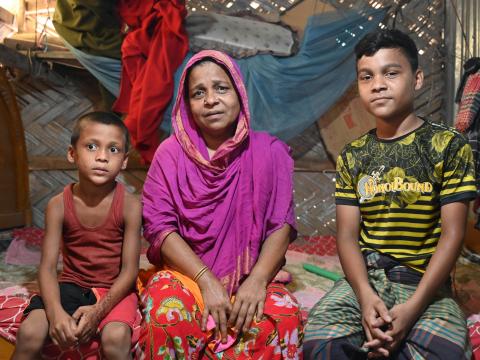Unconditional cash assistance brings relief to Monowara

“I was not a person with a physical disability at my earlier ages. One day , when I was 12, suddenly I felt pain in my legs. I received treatment from a village doctor (not a certified doctor). After a few days, I lost my ability to walk,” says Monowara, 45, a resident of Teknaf sub-district.
Monowara cannot walk without the support of a stick and requires help from her elder son to carry her if she needs to leave her home. Her husband Salam passed away 7 years ago.
She lives with her two younger sons Saiful (16) and Shahidul (7). She has no cultivable land except for 3 decimals (0.012 hectares) of homestead area.
She was living without hope. She saw her neighbors earn money by making handicrafts. She also learned how to make handicrafts from neighbors and earned 3,000 BDT (US$35) per month. “Now I am old and do not have the physical strength to make crafts,” says Monowara.
“When I was struggling to survive, World Vision helped me to come out from poverty,” says Monowara. “After my husband’s death, I had a tough time. I suffered a lot. We did not get good food and dress for my children and couldn’t pay their educational expenses,” she continues.
Monowara is one of 5,229 program participants of the USAID-funded Emergency Food Security Program (EFSP), implemented by World Vision in Ukhiya and Teknaf sub-districts of Cox’s Bazar, aiming to improve the livelihoods of vulnerable people in the area. The project includes the most vulnerable, marginalized, widows, persons with disabilities, and the elderly as project participants.
Considering her living condition, World Vision has provided six unconditional cash transfers. The first time she received 5,600 BDT (US$ 65.88) which she spent on daily food items and clothes for children and for herself. The next three times she received 4,500 each time. which she spent on her treatment and on some furniture.
Monowara also took part in an orientation on homestead gardening and chicken rearing training for income generation to increase her skills and improve her economic condition. In this activity, she received a variety of vegetable seeds and gardening tools as input support.
Monowara says, “Now my children are getting nutritious food. For the last two years, I am engaged with World Vision. With the support of my sons and neighbor, I have established a vegetable garden. I have also saved money in the Savings for Transformation (S4T) group. Before that, it was very difficult for me to run the family. I could hardly eat three meals a day.”
“Every time when I receive cash from World Vision, I agree with my son Saiful on how to spend the money in a proper way. This time, we bought a gas cylinder, rice, salt, and other necessary commodities for the month,” says Monowara.
Through the project, World Vision also rehabilitates roads and persons with disability like Monowara who can’t walk, now get vehicle support easily to go anywhere.
The support from USAID and World Vision has helped Monowara to meet her immediate food need and also allowed her to sell some of her produced vegetables for extra income.
“Now my life is better. I am living a pretty good life,” says Monowara.
This success story is made possible by the generous support of the American people through the United States Agency for International Development (USAID). The contents are the responsibility of World Vision and do not necessarily reflect the views of USAID or the United States Government.